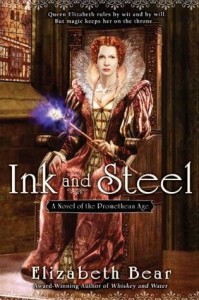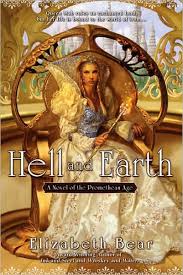 The Stratford Man is what Elizabeth Bear describes as “two tightly linked novels, Ink and Steel and Hell and Earth, a continuation of Bear’s monumental series The Promethean Age that brings the series to a new level of richness.
The Stratford Man is what Elizabeth Bear describes as “two tightly linked novels, Ink and Steel and Hell and Earth, a continuation of Bear’s monumental series The Promethean Age that brings the series to a new level of richness.
The time is late in the sixteenth century and early in the seventeenth, and the action takes place in the England of Elizabeth and James and in the courts of Faerie. The two Queens, Elizabeth and the Mebd, are linked, and one part of this bridge is Kit Marley, known to us as Christopher Marlowe. In the world of Elizabeth, he has been murdered; in the world of Faerie, he is given life, but he faces certain restrictions, the foremost being that he can return to his own world, but only for a little while. Then, if he does not return to Faerie, he will sicken and die for good.
The Prometheans, still in their beginnings, are already divided, with one faction, that of Marley and his replacement Will Shakespeare, the Walsinghams (father and son), the Cecils (at least the elder), Sir Walter Raleigh, and Ben Jonson, among others, supporting Elizabeth and England, and the other, composed of Essex, Robert Poley and Richard Baines — both involved in a ritual at Rheims some years before that set Kit up as a sacrifice — Spain, the Romish Church, and who knows who else, in pursuit of their own agenda. Part of the difficulty here is figuring out who is on which side, and if you expect Bear to make it clear, forget it: no one, including Kit, Will, and their cohorts, is entirely sure about anyone else.
 The story gets a little complicated when Kit, trying to save Will Shakespeare from Baines and Poley, drags Will into Faerie. And Will, in turn, offers himself to save Kit from Hell, as the sacrifice for the teind, Faerie’s seven-year tribute to Hell.
The story gets a little complicated when Kit, trying to save Will Shakespeare from Baines and Poley, drags Will into Faerie. And Will, in turn, offers himself to save Kit from Hell, as the sacrifice for the teind, Faerie’s seven-year tribute to Hell.
Kit and Will are the central focuses here, and on top of the political intrigue Bear has built a love story that in spite of its rough edges is tremendously deep and potent: Bear goes right to the core of love, its costs, and its rewards. The list of Kit’s lovers alone is impressive: Tom Walsingham; Murchaud, the Fae Prince; Mary Poley, Robert’s wife; Morgan, Murchaud’s mother; Lucifer Morningstar, Father of Lies and Lord of Hell; and finally Will, perhaps deepest and truest of all (although conflicted by Will’s equally deep love for his wife Ann, who is a refreshing departure from our usual picture of her), and each shows another facet of what love is and can be, at both its best and its worst.
I mentioned richness. The richness here is something that has been hovering over Bear’s work for a while, and now it’s full-blown. These are not fast moving books, by any means, but they are immediately engaging, and remain engaging, of the “can’t put it down” kind of engaging that one generally associates with action thrillers. Bear builds an almost unbearable tension in the narrative out of ambiguity, both of events and motivations, and out of the characters, each drawn in subtle detail: everyone has an agenda, the agendas may change, and not everyone is who they might seem to be to begin with. (I might also point out that Bear shows an amazing ability to find the humanity in characters who are, when all is said and done, not human in the least.) There’s also the fact that if you don’t know for sure who the good guys are, you’re really in no position to figure out what’s going to happen next or anywhere down the line. That leads to a little bit of angst, of the best sort.
And the books are full of touches, some small, some more central, that provide great resonance: the idea of the magic of the stage being at least in part real magic, encompassed by spells in the lines; the counterpoint in conversations between Kit, an atheist when all is said and done, and Lucifer, whose greatest punishment is that he is not in Heaven; and on another level the interplay between Christian and Celtic myth — a particularly intriguing and original facet of this series already, and brought here to a slow simmer — and the sure ear for the rhythms and patterns of English during the time of Elizabeth, not only the words of the great poets, but the everyday cadences of the commons. (Bear claims that hers is not an accurate rendering, nor do I think it necessarily needs to be; she has the sense of it, and that, after all, is what we need.)
Bear includes a somewhat irreverent afterword detailing her liberties with the history of the time and characters, which for those who expect an historical novel to be “historical” may serve some purpose. I prefer to think that Bear has given us something a little different here. Where others are writing mythic fiction, Bear has written mythic history: it may not be history as it happened (as much as we can know what happened), but it is history that rings true in a much deeper way than a mere relation of events could ever accomplish.
What’s left to say? Brava!
(Roc Books, 2008)
